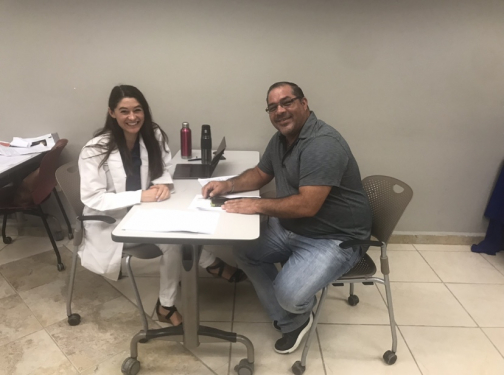Understanding Nutrition for Diabetes Management
Approach to Counseling
My name is Diana Licalzi, and I’m a registered dietitian nutritionist based in Boston, MA. I’ve always been very passionate about helping others develop a healthy, lasting relationship with food. I grew up in both Puerto Rico and the United States, where I noted poor eating habits and recognized that culture, barriers to education and a relatively weak economy conspire against proper nutrition. As a registered dietitian with familiarity with Latin culture, I am very passionate and dedicated to helping both the American and Hispanic community meet their nutrition and health goals. I primarily focus on prediabetes, type 2 diabetes and weight management. I combine evidence-based, medical nutrition therapy with a personalized holistic approach to nutrition. When I am not counseling individuals one-on-one, I’m working at the Boston Medical Center as an Outpatient Dietitian in the Endocrine and Weight Management clinic.
Diabetes Misconceptions in American and Hispanic Population
There are a lot of misconceptions about which foods are appropriate for those with diabetes. I regularly receive questions about “good” and “bad” foods—i.e., can people with diabetes eat bananas, corn, potatoes? However, diabetes nutritional therapy is not a one-size-fits-all approach. It affects people in different ways, and what may work for one person is not necessarily going to work for someone else. I believe people most likely learn about these misconceptions on the internet where there is so much easily accessible information available to the public. I tell my patients that nutrition must be personalized since people struggling with diabetes will be at different stages—some may have better blood sugar control and insulin sensitivity than others. It is imperative that any practitioner working with people diabetes understand their blood sugar control, insulin sensitivity, diet history, medical history, exercise pattern, medication regimen, etc. to give proper nutrition advice. This is why I urge people to avoid searching for answers on the internet and instead work with someone who specializes in the matter.
Understanding Nutrition for Diabetes Management
There is so much misinformation out there on the internet. In my opinion, there is more confusion about proper eating for diabetes than most other illnesses. I believe this stems from the fact that diabetes is essentially a fat metabolism disorder that manifests as a carbohydrate metabolism disorder. For these reasons, many are quick to adopt a low carb or keto diet. While this may work in the short-term, the research shows high-protein, high-fat diets increase one’s risk for cardiovascular disease and premature death. Food for thought—if you have controlled blood sugars but can no longer eat high-fiber carbohydrates then have you really reversed your type 2 diabetes?
Behavior Changes and Diet
Focus on small changes. Small changes will result in big rewards. Trying to change too much too fast often results in failure. I encourage my patients to make SMART goals—goals that are Specific, Measurable, Achievable, Relevant and Time-bound. I also tell my patients to schedule and monitor their goals and progress. For example, if a goal of yours is to exercise more, then schedule your workouts in for the following week. Then monitor how many workouts you completed. By scheduling it in, you’re making it a priority and holding yourself accountable. And by monitoring, you can see how much progress you’ve made, serving as motivation.
Conflicting Information about Food and Diabetes
Unfortunately, people with diabetes are told so many different things. Some are told they can continue to eat what they please as long as they cover it with insulin. Others are told to completely eliminate carbohydrates from their diet. Many times, people receive information on how to manage the symptoms of diabetes but are not informed on how to solve the underlying causes and reverse it. If I didn’t have a good understanding of diabetes, I would be so confused as to what to eat! Food and nutrition play such an essential role in diabetes, therefore, doctors should be making the time and effort to refer patients to specialists.
Achievements by My Patients
Through my approach, I’ve seen patients completely reverse their diabetes. I focus on decreasing the amount of saturated fat and refined carbohydrates in one’s diet and filling it with nutritionally dense foods. I also work with patients to help them find ways to increase physical activity. One patient I worked with lost 13 pounds in one month after switching to whole foods, plant-based diet. She also drastically improved her A1c levels—we are waiting for her most recent lab tests but it looks very promising. Even making simple changes to your diet can lead to tremendous improvements in weight and blood sugar control.
Coping with Complications
Often times, people forget to look beyond just the food. Diabetes is a multifactorial condition and can be caused and affected by so much more than just nutrition. I encourage patients to look at all aspects of their life that could be impacting their blood sugars, including nutrition, stress, physical activity, exposure to toxins, etc. I urge my patients to make their health a priority and to put themselves first.
Nutrition Myths and Facts
Carbohydrates are not the enemy. Instead of completely eliminating this food group, switch your focus to complex carbohydrates—carbohydrates high in fiber. High fiber foods include foods like whole grains, legumes and certain fruits and vegetables. The fiber in carbohydrates acts as a barrier helping to slow down the absorption of the simple sugars in food. For example, it takes much longer to digest beans, than it does white rice because of the high fiber content. Therefore, you do not experience the same spike in your blood glucose. As you switch to high fiber carbs, I also encourage you to focus on decreasing the amount of saturated fat in your diet (i.e., meat, cheese, chicken) to improve insulin sensitivity.
Advice for the Newly Diagnosed Who Need Nutrition and Diet Resources
I’m a fan of the Mastering Diabetes videos which are available for free on YouTube. The Mastering Diabetes program was created by two type 1 individuals, one of which has his Ph.D. in nutritional biochemistry. The program helps people with both type 1 and type 2 diabetes but can be costly. Fortunately, they do offer free videos which are worth watching! I’m also reading The End of Diabetes by Joel Fuhrman, MD for the second time. He does a great job explaining diabetes and the best approaches to reverse it. Lastly, I’m also a fan of Dr. Michael Gregor’s work—he also has great videos (nutritionfacts.org), some of which include diabetes-related content.
Interested in learning more about Diana? Visit her website and follow her on Instagram!





